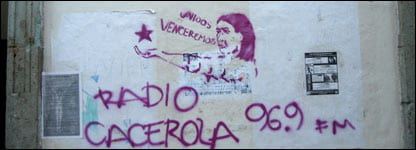
Media, Gender, and Indigenous Radio
Media For Media, Gender, and Indigenous Radio
English Translation
Spanish Translation
- La historia de los derechos humanos, de las mujeres y de los indígenas en el Estado de Oaxaca
- El movimiento social oaxaqueño del 2006: Una cronología audiovisual de junio a noviembre del 2006
- Violaciónes de Derechos Humanos en Oaxaca
- Medios, Género, y Radio Indígena y Comunitaria
- Impactos Políticos e Económicas del Conflicto
- Activismo Indígena
- Jóvenes Organizando y Arte Para el Pueblo

This section corresponds to material in Chapters Five and Six. This section uses ethnographic analysis of the take-overs of Oaxaca radio-stations in 2006 and of the subsequent changes in indigenous community radio stations to explore the connection between radio practices — and in particular the testimonials they broadcast — and the enactment of participatory democracy. When political discussion hit the airwaves following the occupation of radio stations in Oaxaca, testimonials were widely broadcast, and they continue to be programmed on indigenous community-radio broadcasts in Oaxaca. The dynamics of deliberation in community radio programming and in indigenous community assemblies are facilitated by testimonial forms which continue to be effective in indigenous and community radio broadcasts.
One of the primary arenas of women’s participation in the Oaxaca social movement consisted of the initial take-over of state television and radio stations and subsequently of commercial radio stations. Women reprogrammed official media and projected a new vision of the state of Oaxaca and who belongs in it. Among their programming were radio and television testimonials documenting the silencing and marginalization of a wide range of social groups from indigenous women to motorcycle taxi drivers. This section includes testimonials of several women actively involved in that experience, video footage of the take-over, and clips of announcements from their radio and TV broadcasts. Women who characterize themselves as “short, fat, and brown and the face of Oaxaca” spoke and were heard on public media in a way that both transformed them and other people’s vision of who are the legitimate citizens of Oaxaca. Their testimonials reached a previously unreached audience thus creating a new cultural politic of speaking and being heard in Oaxaca.

